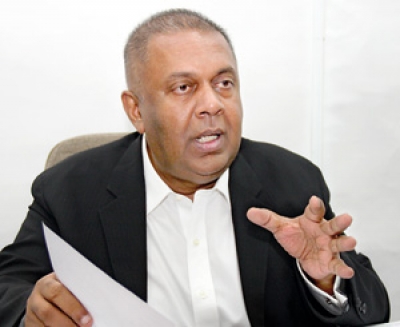The Minister addressing the media yesterday at the Ministry of Finance said that the retail fuel price formula was changed as a result of fluctuations in global prices and the prices will be reviewed every two months using Plats Singapore benchmark prices.
The prices would increase or decrease according to global prices. If the price goes down it will be reflected in the formula. The fuel price is scheduled to go down by early quarter of next year. Accordingly the prices would come down, he said.
Cabinet approved the new fuel price formula and the government decided to implement it from midnight yesterday. The prices of 92 Octane Petrol was raised from Rs.117 a liter to Rs.137, 95 Octane Petrol from Rs.128 to Rs.148 , Auto diesel from Rs.109 a liter to Rs.119, super diesel from Rs.110 to Rs.119 and Kerosene from Rs 44 to Rs 101.Minister Samaraweera said that the fuel prices in Sri Lanka are among the lowest in South Asia and added that the price of 92 Octane petrol in Nepal is Sri Lankan Rs 149 a liter, Bangladesh Rs. 159 and India Rs. 169.
Responding to a question raised by a journalist about the total taxes levied per liter of petrol, State Minister for Finance Eran Wickremaratne said that the tax is around Rs 58.8 per liter of petrol but excise, import duties and port levied included. However, beneficiaries of the Samurdhi income support scheme and fishermen would be given a concession and they would receive kerosene at a price of Rs.44.
Minister Samaraweera said that even though the government has increased fuel prices, it was still among the lowest compared to the prices during the previous regime and the present government reduced the prices when there was a crisis in the global fuel formula. The former government failed to revise the price formula in keeping with global prices. When the price of one barrel of petrol was USD 49, the price of one liter of petrol in Sri Lanka was Rs 157, he said.
The Minister noted that the government needs to focus on rapid development of infrastructure, health and education and cannot continue to bear losses by retailing fuel below the cost.Minister Samaraweera said the change in the price formula will also help to curb corruption related to mixing of kerosene with other fuels and the statistics have shown that diesel vehicle owners use kerosene instead.
He further said that the Treasury will be able to save Rs.55.89 billion and the government has decided to use it for rapid development projects, such as the Gamperaliya project focused on village development which is to commence in August this year. The country will witness rapid development in the coming 18 months, the Minister said.
In the meantime, he said the government has decided to remove all taxes on bank savings accounts for children who are under 18 years of age and authors royalty fee from publishers below the amount of Rs.50,000 per month or Rs.500,00 per year will be exempted from taxes. Minister Samaraweera in response to a question by a journalist whether the price formula was in line with the request made by the International Monetary Fund that a fuel price formula was necessary to balance losses at the Ceylon Petroleum Corporation, he said that the price formula was important for the country, no matter who says it. A good proposal is a good proposal whether it comes from heaven or hell, he said.
When asked whether this price formula would make CPC profitable, Minister Samaraweera said the restructuring of the CPC is vital to make it profitable not just the price formula. Minister Wickremaratne said that all these years, the government decided on the fuel prices and the consumers hardly reaped the benefits even when global fuel prices were down. Now, when global fuel prices go down people also will get fuel at a lower rate, he said
Gamperaliya project focused on village development commence in August














